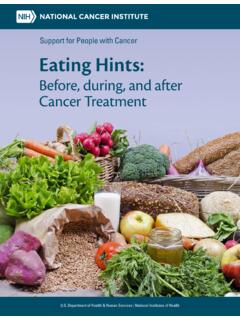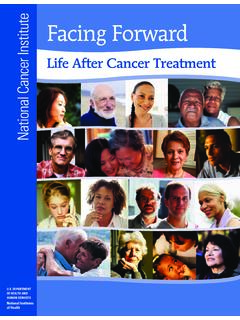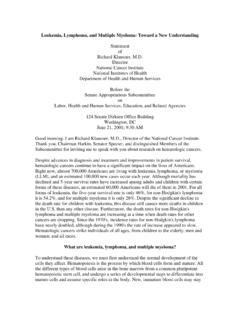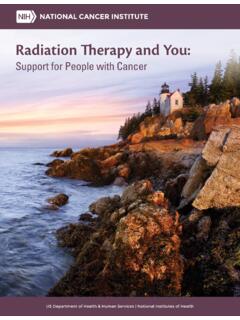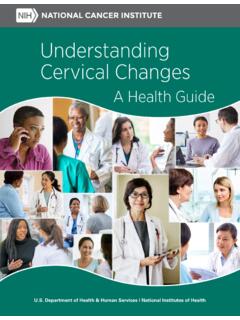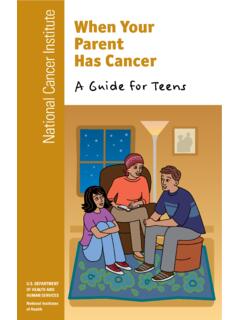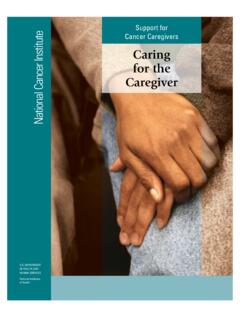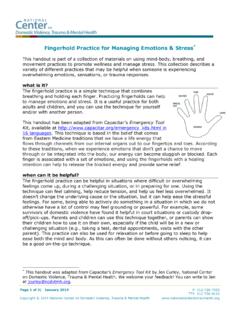Transcription of Thinking About Complementary & Alternative Medicine
1 1 Thinking About Complementary & Alternative MedicineA DEPARTMENT OF HEALTH AND HUMAN SERVICESN ational Institutes of HealthNational Cancer InstituteNational Center for Complementary and Alternative MedicinePATIENT familyEDUCATION&Reasons People With CancerChoose CAMP eople with cancer may use CAM to: Help cope with the side effects of cancertreatments, such as nausea, pain, and fatigue; Comfort themselves and ease the worries of cancer treatment and related stress ; Feel that they are doing something more to help with their own care; Try to treat or cure their ChoicesIt s natural to want to fight your cancer in anyway you can. There is a lot of information available, and new methods for treating cancer are always being tested, so it may be hard to know where to start. This brochure may help you understand whatyou find and make it easier to decide whetherCAM is right for you. Many people try CAMtherapies during cancer care.
2 CAM does notwork for everyone, but some methods may help you manage stress , nausea, pain, or othersymptoms or side most important message of this brochureis to talk to your doctor before you try anythingnew. This will help ensure that nothing gets inthe way of your cancer People With Cancer Choose CAM ..1 Making Choices ..1 What Is Complementary and Alternative Medicine ?..2 Types of Complementary and Alternative Medicine ..3 Talk With Your Doctor Before You Use CAM ..6A Natural Product Does Not Mean a Safe Product ..8 Choose Practitioners With Information From Trusted Sources ..12 Resources ..16 Many Choices You have many choices to make before, during, and after your cancer treatment. One choice you may be Thinking About iscomplementary and Alternative Medicine . We call this CAM, for of Complementary and AlternativeMedicine (CAM)We are learning About CAM therapies every day, butthere is still more to learn.
3 Consumers may use the terms natural, holistic, home remedy, or Easternmedicine to refer to CAM. However, experts use fivecategories to describe it. These are listed below with a few examples for each. (For a complete list oftherapies, go to )Mind-Body MedicinesThese are based on the belief that your mind is able toaffect your body. Some examples are: Meditation:Focused breathing or repetition of wordsor phrases to quiet the mind; Biofeedback:Using simple machines, the patientlearns how to affect certain body functions that arenormally out of one s awareness (such as heart rate); Hypnosis:A state of relaxed and focused attention inwhich the patient concentrates on a certain feeling,idea, or suggestion to aid in healing;3 What Is Complementary and AlternativeMedicine (CAM)?CAM is any medical system, practice, or product that isnot thought of as standard care. Standard medical care is care that is based on scientific evidence.
4 For cancer, it includes chemotherapy, radiation, biological therapy,and surgery. Complementary Medicine Complementary Medicine is used along withstandardmedical treatments. One example is using acupuncture to help with sideeffects of cancer Medicine Alternative Medicine is used in place ofstandardmedical treatments. One example is using a special diet to treat cancerinstead of a method that a cancer specialist (anoncologist) suggests. Integrative Medicine Integrative Medicine is a total approach to carethatinvolves the patient s mind, body, and spirit. Itcombines standard Medicine with the CAM practicesthat have shown the most promise. For example, some people learn to use relaxation as away to reduce stress during chemotherapy. 2 Reflexology(ree-flex-AH-lo-gee): Using pressure pointsin the hands or feet to affect other parts of the body. Energy Medicine Energy Medicine involves the belief that the body hasenergy fields that can be used for healing and use pressure or move the body by placing theirhands in or through these fields.
5 Some examples are: Tai Chi(ty-CHEE): Involves slow, gentle movementswith a focus on the breath and concentration; Reiki(RAY-kee): Balancing energy either from adistance or by placing hands on or near the patient; Therapeutic touch(thair-a-PYU-tik): Moving handsover energy fields of the Yoga:Systems of stretches and poses, with specialattention given to breathing; Imagery:Imagining scenes, pictures, or experiencesto help the body heal; Creative outlets:Such as art, music, or dance. Biologically Based Practices This type of CAM uses things found in nature. Thisincludes dietary supplements and herbal products. Someexamples are: Vitamins HerbsA note About nutrition:It s common for people withcancer to have questions About different foods to eatduring treatment. Yet it s important to know that thereis no one food or special diet that has been proven tocontrol cancer. Too much of any one food is not helpful,and may even be harmful.
6 Because of nutrition needs youmay have, it s best to talk with the doctor in charge ofyour treatment About the foods you should be and Body-Based Practices These are based on working with one or more parts ofthe body. Some examples are: Massage:Manipulation of tissues with hands or special tools; Chiropractic care(ky-ro-PRAK-tik): A type ofmanipulation of the joints and skeletal system; Foods Special dietsWhat questions should I ask my doctor About CAM?What types of CAM might: Help me cope, reduce my stress , and feel better? Help me feel less tired? Help me deal with cancer symptoms, such as pain, or side effects of treatment, such as nausea?If I decide to try a CAM therapy: Will it interfere with my treatment or medicines? Can you help me understand these articles I foundabout CAM? Can you suggest a CAM practitioner for me to talk to? Will you work with my CAM practitioner?7 Whole Medical Systems These are healing systems and beliefs that have evolvedover time in different cultures and parts of the examples are: Ayurvedic Medicine (eye-yer-VAY-dik): A system from India emphasizing balance among body, mind,and spirit; Chinese Medicine : Based on the view that health is abalance in the body of two forces called yin and (AK-yoo-PUNK-cher) is a commonpractice in Chinese Medicine that involves stimulatingspecific points on the body to promote health, or tolessen disease symptoms and treatment side effects; Homeopathy(home-ee-AH-puh-thee): Uses very smalldoses of substances to trigger the body to heal itself; Naturopathic Medicine (na-chur-o-PATH-ik): Uses different methods that help the body naturallyheal With Your Doctor Before You Use CAMSome people with cancer are afraid that their doctor won tunderstand or approve of the use of CAM.
7 But doctorsknow that people with cancer want to take an active part intheir care. They want the best for their patients and oftenare willing to work with them. Talk to your doctor to make sure that all aspects of yourcancer care work together . This is important because thingsthat seem safe, such as certain foods or pills, may interferewith your cancer your doctor if you are taking any dietary supplements,no matter how safe you think they are. This is veryimportant. Even though there are ads or claims thatsomething has been used for years, they do not prove that it is safe or effective. It is still important to be careful. Supplements do not have to be approved by the FederalGovernment before being sold to the public. Also, aprescription is not needed to buy them. Therefore, it s upto consumers to decide what is best for Practitioners With CareCAM practitioners are people who have training in thetherapies listed on pages 2 6.
8 Choosing one should bedone with the same care as choosing a doctor. Here aresome things to remember when choosing a practitioner: Ask your doctor or nurse to suggest someone or speakwith someone who knows About CAM. Ask whether someone at your cancer center ordoctor s office can help you find a CAM may be a social worker or physical therapistwho can help you. Ask whether your hospital keeps lists of centers or hasstaff who can suggest people. Contact CAM professional organizations to get namesof practitioners who are certified. This means thatthey have proper training in their field. (See page 16for resources.)9A Natural ProductDoes Not Mean aSafeProduct Here are some importantfacts About dietarysupplements such as herbsand vitamins: They may affect howwell other medicineswork in your and some plant-basedproducts may keep medicines from doing what they aresupposed to do. These medicines can be ones yourdoctor prescribes for you, or even ones you buy off theshelf at the example, the herb St.
9 John s wort, which somepeople with cancer use for depression, may cause certainanticancer drugs not to work as well as they should. Herbal supplements can act like drugs in your may be harmful when taken by themselves, withother substances, or in large doses. For example, somestudies have shown that kava, an herb that has been usedto help with stress and anxiety, may cause liver damage. Vitamins can also take strong action in your body. For example, high doses of vitamins, even vitamin C, mayaffect how chemotherapy and radiation work. Too muchof any vitamin is not safe even in a healthy person. 8 What questions About the therapy should I askthe CAM practitioner? How can this help me? Do you know of studies that prove it helps? What are the risks and side effects? Will this interfere with my cancer treatment? How long will I be on the therapy? What will it cost? Do you have information that I can read About it?
10 Are there any reasons why I should not use it?Other Questions To Ask Yourself Do I feel comfortable with this person? Do I like how the office looks and feels? Do I like the staff? Does this person support standard cancer treatments? How far am I willing to travel for treatment? Is it easy to get an appointment? Are the hours good for me? Will insurance cover the cost of CAM?Call your health plan or insurer to see whether theycover CAM therapies. Many are not Contact local health and wellness organizations. Ask About each practitioner s training and experience. Ask whether the practitioner has a license to practicein your state. If you want to confirm the answer, askwhat organization gives out the licenses. Then, youmay choose to follow up with a phone call. Call your health care plan to see if it covers this general questions should I ask the CAMpractitioner? What types of CAM do you practice?

